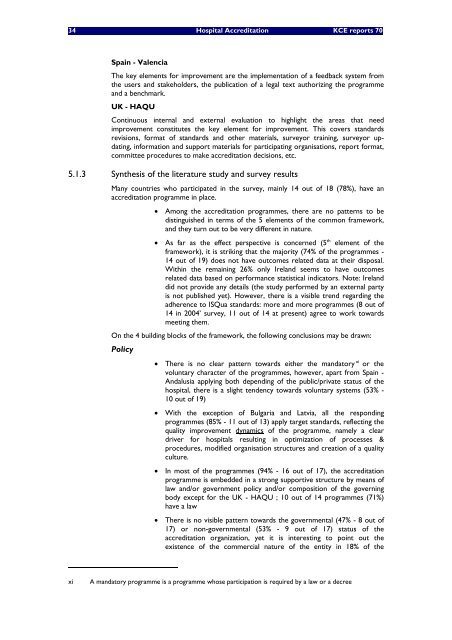Vergelijkende studie van ... - KCE
Vergelijkende studie van ... - KCE
Vergelijkende studie van ... - KCE
You also want an ePaper? Increase the reach of your titles
YUMPU automatically turns print PDFs into web optimized ePapers that Google loves.
34 Hospital Accreditation <strong>KCE</strong> reports 70<br />
Spain - Valencia<br />
The key elements for improvement are the implementation of a feedback system from<br />
the users and stakeholders, the publication of a legal text authorizing the programme<br />
and a benchmark.<br />
UK - HAQU<br />
Continuous internal and external evaluation to highlight the areas that need<br />
improvement constitutes the key element for improvement. This covers standards<br />
revisions, format of standards and other materials, surveyor training, surveyor updating,<br />
information and support materials for participating organisations, report format,<br />
committee procedures to make accreditation decisions, etc.<br />
5.1.3 Synthesis of the literature study and survey results<br />
Many countries who participated in the survey, mainly 14 out of 18 (78%), have an<br />
accreditation programme in place.<br />
• Among the accreditation programmes, there are no patterns to be<br />
distinguished in terms of the 5 elements of the common framework,<br />
and they turn out to be very different in nature.<br />
• As far as the effect perspective is concerned (5 th element of the<br />
framework), it is striking that the majority (74% of the programmes -<br />
14 out of 19) does not have outcomes related data at their disposal.<br />
Within the remaining 26% only Ireland seems to have outcomes<br />
related data based on performance statistical indicators. Note: Ireland<br />
did not provide any details (the study performed by an external party<br />
is not published yet). However, there is a visible trend regarding the<br />
adherence to ISQua standards: more and more programmes (8 out of<br />
14 in 2004’ survey, 11 out of 14 at present) agree to work towards<br />
meeting them.<br />
On the 4 building blocks of the framework, the following conclusions may be drawn:<br />
Policy<br />
• There is no clear pattern towards either the mandatory xi or the<br />
voluntary character of the programmes, however, apart from Spain -<br />
Andalusia applying both depending of the public/private status of the<br />
hospital, there is a slight tendency towards voluntary systems (53% -<br />
10 out of 19)<br />
• With the exception of Bulgaria and Latvia, all the responding<br />
programmes (85% - 11 out of 13) apply target standards, reflecting the<br />
quality improvement dynamics of the programme, namely a clear<br />
driver for hospitals resulting in optimization of processes &<br />
procedures, modified organisation structures and creation of a quality<br />
culture.<br />
• In most of the programmes (94% - 16 out of 17), the accreditation<br />
programme is embedded in a strong supportive structure by means of<br />
law and/or government policy and/or composition of the governing<br />
body except for the UK - HAQU ; 10 out of 14 programmes (71%)<br />
have a law<br />
• There is no visible pattern towards the governmental (47% - 8 out of<br />
17) or non-governmental (53% - 9 out of 17) status of the<br />
accreditation organization, yet it is interesting to point out the<br />
existence of the commercial nature of the entity in 18% of the<br />
xi A mandatory programme is a programme whose participation is required by a law or a decree

















